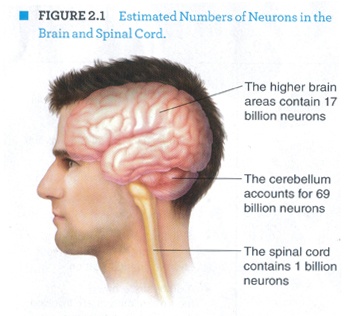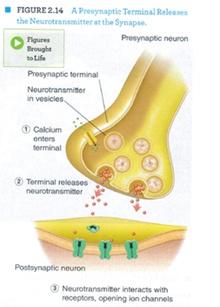Understanding Neurotransmitters
How are emotion and mood developed and affected in the brain? Science has made much progress in recent decades on the study of the human brain, but much is left to be discovered. In this article we’ll take a look at a small piece of what we do know, and set the stage for some practical applications that we can use to increase performance.
Excerpts in this article will be taken from the book “Brain and Behavior” by Bob Garrett and Gerald Hough. This is an excellent textbook used in the study of neuroscience and behavioral psychology. I highly recommend picking up a copy if you have an interest.
About half of the human brain is made up of over 80 billion nerve cells called neurons. Neurons can be defined as “specialized cells that convey sensory information into the brain; carry out the operations involved in thought, feeling, and action; and transmit commands into the body to control muscles and organs.”

There are three primary types of neurons. Motor neurons transmit commands to the muscles and organs. Sensory neurons carry information from the body and from the outside world into the brain and spinal cord. Interneurons connect neurons to one another. The below graphic shows an example of a basic sensory neuron.

“Dendrites are extensions that branch out from the cell body to receive information from other neurons. Their branching structure allows them to collect information from many neurons. The axon extends like a tail from the cell body and carries information to other locations… Branches at the end of the axon culminate in swellings called axon terminals. The terminals contain chemical neurotransmitters, which the neuron releases to communicate with a muscle, an organ or the next neuron in a chain.”
Brain & Behavior

The neurotransmitters that are used to communicate are what I will focus on with this article. There are numerous known neurotransmitters. Neuroscientists believe there are also numerous additional transmitters yet to be discovered. The science is still evolving. For our purposes we are going to examine three neurotransmitters: serotonin, dopamine, and oxytocin. Let’s define them each here.
Serotonin is involved in regulation of mood. When your serotonin levels are normal you feel happier, calmer, focused, less anxious, and more emotionally stable. It also plays a role in healthy digestion. Serotonin is made from the amino acid tryptophan, which must be ingested through diet or supplement.
Dopamine plays many roles, but it is widely known as the “feel good” neurotransmitter. It is strongly associated with pleasure and reward.
Oxytocin can be considered your body’s natural pain reliever. Not to be confused with the addictive prescription drug oxycontin, oxytocin is naturally produced in your brain’s hypothalamus, and released during various activities. It is a natural stress reliever, countering the effects of the stress hormone cortisol. Oxytocin is released primarily through human touch. It can be felt from a hug, a massage, sex, as well as when a woman gives birth or breast feeds. The good news for dog lovers is that oxytocin is also released when you pet or play with a dog. This neurotransmitter leaves you with a feeling of deep relaxation, ready for sleep, as well as works to build trust and attachment.
Each neurotransmitter can affect various behaviors as well as processes in the body. For instance, serotonin is involved in regulating mood, sleep and arousal, depression, aggression, and more. If serotonin levels are low, we can become impulsive, depressed, and aggressive. Conversely, higher serotonin levels will have the effect of leaving you more relaxed, socially agreeable, and a higher degree of “will power”. You can read more about serotonin versus dopamine in this article.
Today’s pharmaceutical industry has capitalized on the effects of neurotransmitters. For instance:
“Controlling how much neurotransmitter remains in the synapse is one way to vary behavior, and many drugs capitalize on this mechanism. Cocaine blocks the reuptake of dopamine; some antidepressant medications block the reuptake of serotonin.”
Brain & Behavior
It’s easy to see how mood and emotion can effect trading. As we begin to imagine how our behaviors are affected by neurotransmitters, creating a lifestyle that looks to better manage them becomes important. In the coming parts of our series we will examine healthy ways to boost and manage neurotransmitters naturally to help handle and process stressful situations and difficult emotions.

